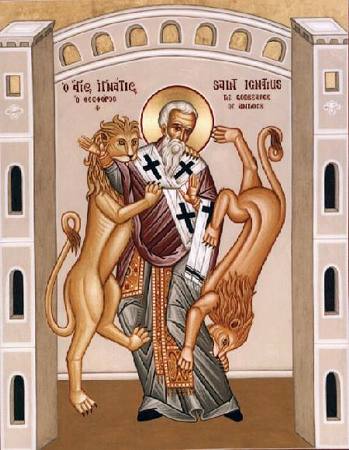Pseudo-Ignatius on:
[Wikipedia]
[Google]
[Amazon]
 Pseudo-Ignatius was a 4th-century writer who claimed to be
Pseudo-Ignatius was a 4th-century writer who claimed to be
 Pseudo-Ignatius was a 4th-century writer who claimed to be
Pseudo-Ignatius was a 4th-century writer who claimed to be Ignatius of Antioch
Ignatius of Antioch (; Greek: Ἰγνάτιος Ἀντιοχείας, ''Ignátios Antiokheías''; died c. 108/140 AD), also known as Ignatius Theophorus (, ''Ignátios ho Theophóros'', lit. "the God-bearing"), was an early Christian writer ...
. He is the author of the Ignatian forgeries but he also wrote the Apostolic Constitutions
The ''Apostolic Constitutions'' or ''Constitutions of the Holy Apostles'' (Latin: ''Constitutiones Apostolorum'') is a Christian collection divided into eight books which is classified among the Church Orders, a genre of early Christian litera ...
and a Commentary on Job. Harnack also identified Pseudo-Clement
Clementine literature (also called Clementina, Pseudo-Clementine Writings, Kerygmata Petrou, Clementine Romance) is the name given to the religious romance which purports to contain a record made by one Clement (whom the narrative identifies as ...
with Pseudo-Ignatius. Pseudo-Ignatius has some Arian leanings, but not completely Arian, yet on the hand, he in some ways resembles the Apollinarians. However it is not possible to draw clear conclusions on his Christology
In Christianity, Christology (from the Ancient Greek, Greek grc, Χριστός, Khristós, label=none and grc, wiktionary:-λογία, -λογία, wiktionary:-logia, -logia, label=none), translated literally from Greek as "the study of Chr ...
.
According to Bart D. Ehrman
Bart Denton Ehrman (born 1955) is an American New Testament scholar focusing on textual criticism of the New Testament, the historical Jesus, and the origins and development of early Christianity. He has written and edited 30 books, including t ...
, the writer likely claimed the name Ignatius to bolster his own theological views.
Theology
Pseudo-Ignatius opposedasceticism
Asceticism (; from the el, ἄσκησις, áskesis, exercise', 'training) is a lifestyle characterized by abstinence from sensual pleasures, often for the purpose of pursuing spiritual goals. Ascetics may withdraw from the world for their p ...
and he had Arian
Arianism ( grc-x-koine, Ἀρειανισμός, ) is a Christological doctrine first attributed to Arius (), a Christian presbyter from Alexandria, Egypt. Arian theology holds that Jesus Christ is the Son of God, who was begotten by God t ...
leanings. In the Apostolic Constitutions, he held 1-3 Maccabees, 1-2 Clement and possibly Judith as canonical (however some manuscripts lack Judith), but denied the canonical status of the Book of Revelation
The Book of Revelation is the final book of the New Testament (and consequently the final book of the Christian Bible). Its title is derived from the first word of the Koine Greek text: , meaning "unveiling" or "revelation". The Book of R ...
.
Pseudo-Ignatius in the Apostolic Constitutions affirmed peadocommunion. and Baptism by immersion
Immersion may refer to:
The arts
* "Immersion", a 2012 story by Aliette de Bodard
* ''Immersion'', a French comic book series by Léo Quievreux#Immersion, Léo Quievreux
* Immersion (album), ''Immersion'' (album), the third album by Australian gro ...
.
Writings
Epistles attributed to Pseudo-Ignatius include: * Epistle to the Tarsians * Epistle to the Antiochians * Epistle to Hero, a Deacon of Antioch * Epistle to the Philippians * The Epistle of Maria the Proselyte to Ignatius * Epistle to Mary at Neapolis, Zarbus * First Epistle to St. John * Second Epistle to St. John * The Epistle of Ignatius to the Virgin Mary * The Apostolic Constitutions * Commentary on JobReferences
{{Reflist 4th-century Arian Christians 4th-century Christian theologians 4th-century Romans